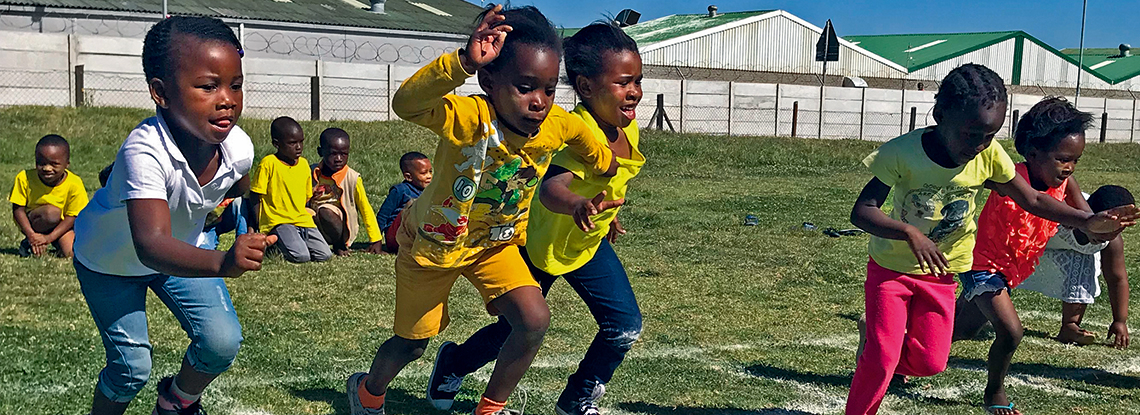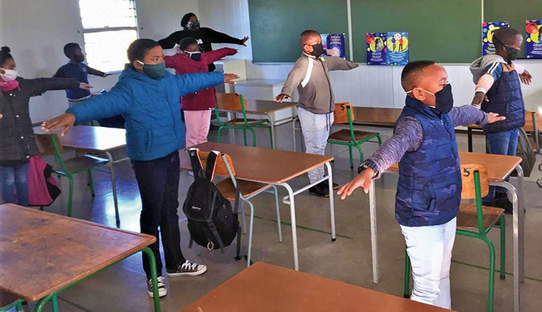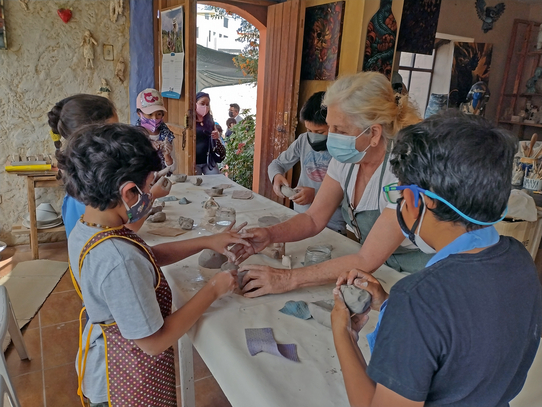Promote educational justice now: For a good start in life
The Corona pandemic is exacerbating global and social inequality. Waldorf schools and kindergartens are also feeling the effects. With our new appeal for donations we want to help them.

The gap between rich and poor is getting wider and wider
In spring 2020, our urgent appeal Mitigating the Consequences of the Corona Crisis started our Joint Action: Corona Aid. The positive response and the many donations, the help from Waldorf schools, foundations and the Federation of Independent Waldorf Schools was overwhelming. We were able to forward more than €1.5 million to more than 100 institutions in 37 countries. Thanks to your help, not only were parents and children in need provided with food, but in many places Waldorf educational care for children and young people was maintained to the highest quality possible under the respective Corona regulations of the country and the technical requirements of the institution. Thanks to the many donations, the closure of schools and kindergartens could be prevented in all those cases known to us.
Many Waldorf schools and kindergartens tried to make ends meet for over a year without outside help. They have only been contacting us for a few months, often with the bitter realisation that all reserves have been used up and running costs can no longer be borne. In some cases, the situation also remains tense due to political and social grievances. The extreme situation caused by the pandemic increases global and social inequality – also, and especially, in education.

South Africa: lack of pupils due to emigration
Many Waldorf schools in South Africa currently have far fewer pupils than two years ago. The reason for this is not only the Corona pandemic and the consequences of the restrictions. “South Africa has a multitude of problems that have been exacerbated by the pandemic,” William Bester explains in an online conversation with us. He is principal of the Michael Mount Waldorf School in Johannesburg and a board member of the Federation of Waldorf Schools in South Africa. The country has been severely weakened after corruption scandals and mismanagement in recent years. The vaccination campaign is progressing slowly, aid money to support businesses has been embezzled and politicians are said to have enriched themselves in illegal business deals during the ban on alcohol and cigarettes. In addition, there was massive unrest following the recent imprisonment of the former president. Poverty in the country is increasing, working conditions are deteriorating. “The gap between rich and poor is getting bigger and bigger,” William Bester tells us, “and those who have the opportunity are leaving the country.”
And with that, the financial balance of Waldorf schools in South Africa is also shaking. Right now it is important that the Waldorf schools can continue to operate despite lower parental contributions. The costs have increased due to the hygiene requirements: more rooms are needed to be able to keep distances. After taking the temperature, the pupils have to be questioned in detail about symptoms: “Do you have a headache? Do you have a sore throat? Do you have aching limbs? Is your nose running?” Anyone with more than one of these symptoms is sent home. There are no quick tests. Then there are the regular disinfections of the classrooms. All this costs money and requires a relatively substantial number of staff. In South Africa’s largest Waldorf school alone, 16 teaching positions have already had to be cut. The smaller schools have also had to lay off staff at all levels. Only with the help of donations can these self-restricting mechanisms be overcome.

Peru: schools were closed for well over a year
Schools in Peru were closed from March 2020 until the end of September 2021. Teaching took place exclusively via the internet or radio. This is a problem in rural areas of Peru, where there is often neither internet nor reliable radio reception. “I have heard of children who climbed up some mountain for radio lessons,” Bettina Vielmetter tells us in a Zoom meeting. She also reports on the onerous restrictions due to Corona measures. In April 2021, for example, a double mask requirement was introduced. In supermarkets or other indoor public spaces, two masks had to be worn on top of each other at all times. In public transport, wearing a visor is also compulsory. Many people comply with the regulations, if at all feasible, in the densely populated big cities. “There is a lot of concern because of the low admission capacity of hospitals,” says Bettina Vielmetter.
Nothing has been done politically to improve the health system, nor the education system. “Long before schools and kindergartens and all other cultural institutions were reopened, retail and gastronomy, for example, were allowed to start work.” Only since 29th September 2021 have schools been allowed to teach on site again, and under the strictest conditions, which only very few schools can fulfil. Therefore, most schools will remain closed at least until the end of the year. The consequence is, therefore, that most children must continue to remain at home because even in the few schools that are operating, teaching can only take place in ‘shifts’. “Everything is crying out for change,” says Vielmetter, “but the politicians have not taken the opportunity for renewal that the crisis certainly offers.”
The Waldorf teachers in Peru have not let this opportunity pass: “We are completely reinventing ourselves,” some teachers said during the pandemic. In the kindergarten as well as in the primary school classes, there were lessons in the park instead of online lessons, for example. Those who were worried about infection were taught at home, among other things, via video messages and with the involvement of parents. The teachers worked with two completely different forms of teaching at the same time, which meant more work with sometimes greatly reduced salaries. Nevertheless, the challenges caused by the pandemic were experienced positively.
The most important goal is of course to be able to teach all the children together again as quickly as possible. But without help, many Waldorf schools and Waldorf kindergartens in Peru cannot carry out the necessary hygiene measures. In addition, a large proportion of parents continue to make much smaller financial contributions than before the pandemic.
